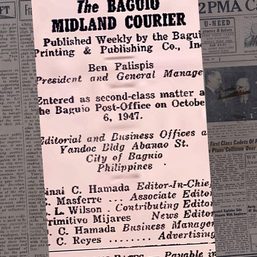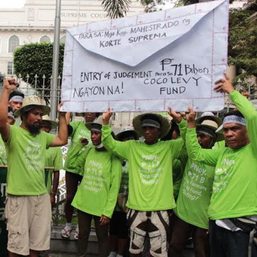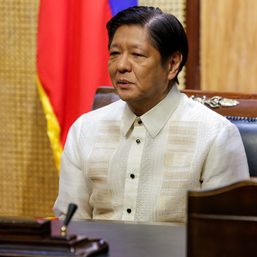SUMMARY
This is AI generated summarization, which may have errors. For context, always refer to the full article.
![[OPINION] History and inconvenient truths: the politics of silences and erasures](https://www.rappler.com/tachyon/2023/09/politics-silences-erasures-september-15-2023.jpg)
With the 51st anniversary of the declaration of Martial Law just around the corner, a controversial memorandum from the Department of Education surfaced online. The said proposed directive sought to remove the name Marcos from “Diktadurang Marcos,” denoting the period of Martial Law and the dictatorship of Ferdinand E. Marcos as the period appears in the Grade 6 Araling Panlipunan curriculum. Receiving much backlash from progressive groups at the House of Representatives, the initiative had been cited to have the insidious aim of historical revisionism, erasure, and outright disinformation.
Why should we bother discussing the way we name the period of dictatorship experienced by our country in the past? Two things come to my mind: the relevance of periodization and the politics of silences in history.
In historiography and the broader social sciences, the vastness of the past is rendered intelligible by dividing it into parts – periods. Periodization, put simply, is the way we organize the past through any number of anchors: cultural, economic, political, or social determinants that give a particular portion of the past relatively similar, related facets.
In European historiography for example, the general periods had been termed as classical, medieval, and modern. Specific events in world history had also comprised particular periods in themselves (e.g. World War I and World War II). While periodization makes it manageable for us in the present to view and study the past, one critical aspect that it signals pertains to the context of a particular time. And context renders periodization diverse across different parts of the world. When the Europeans refer to “contemporary history” they generally mean the 20th century, often demarcated by the beginning in the First World War. In the Philippines, however, contemporary history is often regarded to begin after the Japanese Occupation.
The context within which events occur provide us with the scaffold in making sense of how things unfolded. Thus, the ways in which we refer to these periods carry significance. In the case of the period of Martial Law in the 1970s, while it is generally understood that the regime came under the senior Marcos, calling it “Diktadurang Marcos” further designates its place in the broader history of the Philippines, especially in light of several Martial Law declarations before and after him.
For example, Emilio Aguinaldo declared martial law during his presidency in the incipient Philippine Republic, Jose P. Laurel also did during the Pacific War, and Gloria Macapagal Arroyo had hers implemented in Mindanao during her term. Thus, there is value in rightfully maintaining that the Martial Law of the 1970s be designated to mean the dictatorship of Ferdinand E. Marcos.
Furthermore, the “dictatorship” being attached to the “dictator” is important because it serves as a reminder of the pivotal, if not decisive, role that the elder Marcos played in this period of our past. It underscores the important context that the period of Martial Law entailed in the concentration of power to the executive and Marcos Sr. was at its helm.
With the current president being the son of the dictator, it comes as no surprise that when the Martial Law of the 1970s is discussed with its attendant violence that resulted in human rights violations, debilitating corruption, and institutional breakdown, the reality of the time constitutes inconvenient truths. Its inconvenience is especially acute for the Marcos family and politically tricky for those in the education department. But history as the narrative of our past is a tapestry of events and many of these events will always be difficult to confront. Should we shy away from these inconvenient truths, or should we dwell in its complexity?
With these inconvenient truths come an important aspect of history that many historians contend with: the politics of silences. For every mention of a name in the annals of history, hundred others were not able to make it on the record. For every event, versions and recollections diverging from what has been recorded are lost or, worse, hidden. Describing the process of silences in history, Haitian historian Michele-Rolph Trouillot writes that: “the presence and absences embodied in [historical] sources are neither neutral nor natural. They are created. As such, they are not mere presences and absences, but mentions and silences of various kinds and degrees. One ‘silences’ a fact or individual as a silencer silences a gun. Mentions and silences are thus active dialectical counterparts of which history is the synthesis.”[1]
While silences in history often allude to the damaging violence of the literal and discursive erasure of peoples and their experiences from historical accounts, the move to remove the name “Marcos” in the term “Diktadurang Marcos” does the opposite for the Marcos family. In doing so, the danger of eventually disentangling the period of Martial Law of the 1970s from the Marcoses could dilute the culpability of Marcos Sr. in the reckoning of this period in our history.
In the immediate aftermath of the fall of the “Diktadurang Marcos,” one polarizing issue that plagued the nation centered on the notion of reconciliation and justice. As former NHCP chair Maria Serena Diokno writes in an article, “reconciliation was premised on the belief that badly divided by Martial rule, we needed to come together as one, to forgive our prodigal siblings, and begin the task of national reconstruction. Justice, on the other hand, demanded that those who had killed, maimed, and stolen, be tried and punished, for their actions were more than personal actions, they were crimes against the people.”[2] Until today, the discourse of “unity” becomes a rallying cry that steers the politics of remembering the Diktadurang Marcos away from discussing justice and accountability.
It is important to remind ourselves that the Martial Law of the 1970s is Diktadurang Marcos. It is furthermore important that we pass this on to the next generation, if only for us to maintain the call for justice and accountability. If the Marcos family is genuine in their quest to present a new leaf, they must also do so by confronting the inconvenient truths of their family’s past as it inextricably twines with the nation’s past. They must face the judgment of history, not evade it and enable its erasure. They ought to let history live, not stifle its breath. – Rappler.com
Aaron Mallari is assistant professor in the Department of Political Science, University of the Philippines Diliman. He holds a BA and MA History from UP Diliman and MA Global Studies from the University of Vienna and Ghent University. Together with friends, he hosts and produces PODKAS (www.podkas.org) a podcast about Philippine history, politics, and society. He tweets at @aaron.the.world
[1] Michel-Rolph Troulliot, Silencing the Past: Power and the production of history (Boston: Beacon Press, 1995), p. 48.
[2] Maria Serena Diokno, “Memory as a Means of Empowerment” Memory, Truth Telling, and the Pursuit of Justice: A conference on the legacies of the Marcos Dictatorship”
1 comment
How does this make you feel?
![[Closer Look] ‘Join Marcos, avert Duterte’ and the danger of expediency](https://www.rappler.com/tachyon/2024/06/TL-trillanes-duterte-expediency-june-29-2024.jpg?resize=257%2C257&crop_strategy=attention)

![[Newspoint] A Freedom Week joke](https://www.rappler.com/tachyon/2024/06/20240614-Filipino-Week-joke-1.jpg?resize=257%2C257&crop_strategy=attention)


![[Newspoint] A fighting presence](https://www.rappler.com/tachyon/2024/07/thought-leaders-a-fighting-presence.jpg?resize=257%2C257&crop=441px%2C0px%2C1080px%2C1080px)



![[OPINION] Raised on radio](https://www.rappler.com/tachyon/2024/04/raised-on-radio.jpg?resize=257%2C257&crop=396px%2C0px%2C720px%2C720px)
![[Just Saying] Marcos: A flat response, a missed opportunity](https://www.rappler.com/tachyon/2024/04/tl-marcos-flat-response-april-16-2024.jpg?resize=257%2C257&crop=277px%2C0px%2C720px%2C720px)



![[OPINION] From ‘Puyat’ to ‘Tulog’: Clout-chasing street signs disrespected history](https://www.rappler.com/tachyon/2024/07/gil-puyat-july-26-2024.jpg?resize=257%2C257&crop=389px%2C0px%2C1080px%2C1080px)


![[Time Trowel] Yamashita gold is a myth, and treasure hunting is not archeology](https://www.rappler.com/tachyon/2024/06/myth-yamashita-treasure-june-14-2024.jpg?resize=257%2C257&crop=435px%2C0px%2C1080px%2C1080px)
Thanks to Aaron Mallari for his inspiring article, “History and inconvenient truths: the politics of silences and erasures.” What is sad is that the Marcos Disinformation Machinery is doing well in erasing these “inconvenient truths” and converting falsehoods into “convenient truths.” For those against such erasures, the Marcos Repression Machinery will “silence” them. This process of “erasures” and “silences” will continue and should even get better and stronger to pave the way of those in the long Presidential waiting list: VP Sara Duterte, Senator Imee Marcos, Speaker Martin Romualdez and, most important, Sandro Marcos.